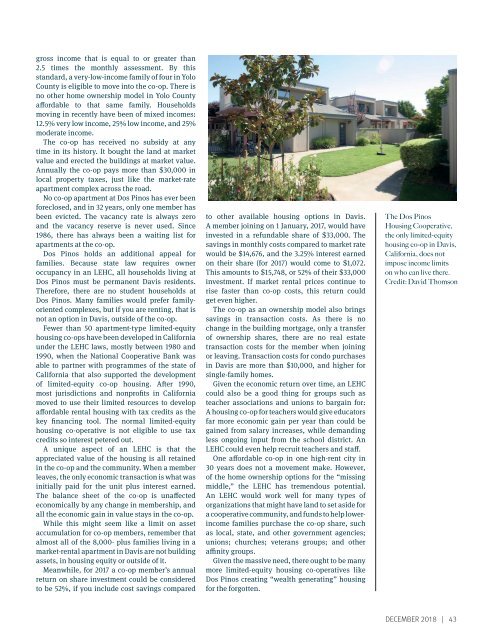DECEMBER 2018
The December edition of Co-op News: connecting, challenging and championing the global co-operative movement. This issue we look at the issue of engagement, and the co-operative way of making connections. Plus coverage of the 2018 Practitioners Forum, new Real Living Wage rates and member-nominated director (MND) elections at the Co-op Group.
The December edition of Co-op News: connecting, challenging and championing the global co-operative movement. This issue we look at the issue of engagement, and the co-operative way of making connections. Plus coverage of the 2018 Practitioners Forum, new Real Living Wage rates and member-nominated director (MND) elections at the Co-op Group.
Create successful ePaper yourself
Turn your PDF publications into a flip-book with our unique Google optimized e-Paper software.
gross income that is equal to or greater than<br />
2.5 times the monthly assessment. By this<br />
standard, a very-low-income family of four in Yolo<br />
County is eligible to move into the co-op. There is<br />
no other home ownership model in Yolo County<br />
affordable to that same family. Households<br />
moving in recently have been of mixed incomes:<br />
12.5% very low income, 25% low income, and 25%<br />
moderate income.<br />
The co-op has received no subsidy at any<br />
time in its history. It bought the land at market<br />
value and erected the buildings at market value.<br />
Annually the co-op pays more than $30,000 in<br />
local property taxes, just like the market-rate<br />
apartment complex across the road.<br />
No co-op apartment at Dos Pinos has ever been<br />
foreclosed, and in 32 years, only one member has<br />
been evicted. The vacancy rate is always zero<br />
and the vacancy reserve is never used. Since<br />
1986, there has always been a waiting list for<br />
apartments at the co-op.<br />
Dos Pinos holds an additional appeal for<br />
families. Because state law requires owner<br />
occupancy in an LEHC, all households living at<br />
Dos Pinos must be permanent Davis residents.<br />
Therefore, there are no student households at<br />
Dos Pinos. Many families would prefer familyoriented<br />
complexes, but if you are renting, that is<br />
not an option in Davis, outside of the co-op.<br />
Fewer than 50 apartment-type limited-equity<br />
housing co-ops have been developed in California<br />
under the LEHC laws, mostly between 1980 and<br />
1990, when the National Cooperative Bank was<br />
able to partner with programmes of the state of<br />
California that also supported the development<br />
of limited-equity co-op housing. After 1990,<br />
most jurisdictions and nonprofits in California<br />
moved to use their limited resources to develop<br />
affordable rental housing with tax credits as the<br />
key financing tool. The normal limited-equity<br />
housing co-operative is not eligible to use tax<br />
credits so interest petered out.<br />
A unique aspect of an LEHC is that the<br />
appreciated value of the housing is all retained<br />
in the co-op and the community. When a member<br />
leaves, the only economic transaction is what was<br />
initially paid for the unit plus interest earned.<br />
The balance sheet of the co-op is unaffected<br />
economically by any change in membership, and<br />
all the economic gain in value stays in the co-op.<br />
While this might seem like a limit on asset<br />
accumulation for co-op members, remember that<br />
almost all of the 8,000- plus families living in a<br />
market-rental apartment in Davis are not building<br />
assets, in housing equity or outside of it.<br />
Meanwhile, for 2017 a co-op member’s annual<br />
return on share investment could be considered<br />
to be 52%, if you include cost savings compared<br />
to other available housing options in Davis.<br />
A member joining on 1 January, 2017, would have<br />
invested in a refundable share of $33,000. The<br />
savings in monthly costs compared to market rate<br />
would be $14,676, and the 3.25% interest earned<br />
on their share (for 2017) would come to $1,072.<br />
This amounts to $15,748, or 52% of their $33,000<br />
investment. If market rental prices continue to<br />
rise faster than co-op costs, this return could<br />
get even higher.<br />
The co-op as an ownership model also brings<br />
savings in transaction costs. As there is no<br />
change in the building mortgage, only a transfer<br />
of ownership shares, there are no real estate<br />
transaction costs for the member when joining<br />
or leaving. Transaction costs for condo purchases<br />
in Davis are more than $10,000, and higher for<br />
single-family homes.<br />
Given the economic return over time, an LEHC<br />
could also be a good thing for groups such as<br />
teacher associations and unions to bargain for:<br />
A housing co-op for teachers would give educators<br />
far more economic gain per year than could be<br />
gained from salary increases, while demanding<br />
less ongoing input from the school district. An<br />
LEHC could even help recruit teachers and staff.<br />
One affordable co-op in one high-rent city in<br />
30 years does not a movement make. However,<br />
of the home ownership options for the “missing<br />
middle,” the LEHC has tremendous potential.<br />
An LEHC would work well for many types of<br />
organizations that might have land to set aside for<br />
a cooperative community, and funds to help lowerincome<br />
families purchase the co-op share, such<br />
as local, state, and other government agencies;<br />
unions; churches; veterans groups; and other<br />
affinity groups.<br />
Given the massive need, there ought to be many<br />
more limited-equity housing co-operatives like<br />
Dos Pinos creating “wealth generating” housing<br />
for the forgotten.<br />
The Dos Pinos<br />
Housing Cooperative,<br />
the only limited-equity<br />
housing co-op in Davis,<br />
California, does not<br />
impose income limits<br />
on who can live there.<br />
Credit: David Thomson<br />
<strong>DECEMBER</strong> <strong>2018</strong> | 43


















